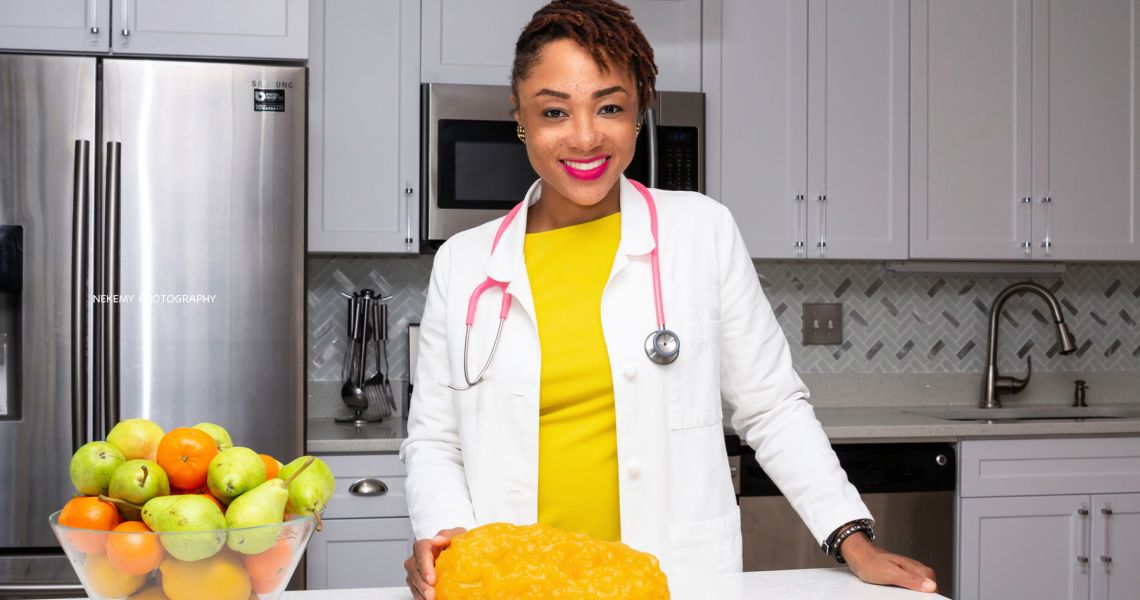Sylvia Gonsahn-Bollie, MD ’10, RESD ’14, remembers wanting to be a doctor as early as 5 years old, frequently doctoring her dolls back to health. But it was helping to care for her grandmother, also named Sylvia, who lived with the family until Bollie was 17 that solidified her decision to become a doctor. Her grandmother had obesity complicated by diabetes and hypertension, and she eventually suffered a stroke that put her in a nursing home for three years until her passing.
As a medical student at the George Washington University (GW) School of Medicine and Health Sciences (SMHS), Bollie planned to build a career in academic medicine. “I love teaching and explaining things,” she says. “I like to say ‘I speak patient well.’ ”
However, life does not always lead you down the path you expect it will. After finishing her residency at GW Hospital, Bollie and her family moved to Richmond, Virginia where she became a full-time primary care physician at a busy non-academic practice. The move, she says, also corresponded with her own weight gain.
“Through medical school and residency, food was my coping mechanism,” she says. “I had also gained weight from my first child. Between stress eating and lack of sleep as a busy new attending physician, my wellness took a backseat to motherhood and my career so I could not get the weight off.”
Over time Bollie recalls she felt “tired all the time, less energetic, and less confident.” She decided to embark on a weight-loss and wellness journey, which taught her much more about the disease of obesity. “As an internist, the lightbulb clicked on how [obesity] was the connection with all the diseases I was treating,” she says. “I realized obesity is more than a symptom of disease. It is the main disease. That’s when I started to use my medical education training to do more public education.”
Bollie turned to social media and learned to use it as a tool for educating and engaging patients, and also developing partnerships with other physicians doing the same kind of work. Through the process, she learned more about physician ownership, physician autonomy, and the limitations that can come with working in an employed position. She decided to put her creativity to use and has now started her own practice and coaching programs, something she never thought she would do.
“When I graduated with a certification from the SMHS Medical Education Leadership track,” she adds. “I thought education looked like research, writing papers, and being at a big institution. But I’ve learned it doesn’t have to look like that.”
Bollie’s program, Embrace YOU Weight & Wellness offers a personalized, holistic, and scientific approach to sustainable weight loss with an emphasis on self-love. The methodology for the program is informed by her personal and professional experience, which now includes board certification by the American Board of Obesity Medicine. Bollie’s experiences taught her that each body is different and thus weight loss strategies must be individualized to the patient.
Thinking back on her experience caring for her grandmother, Bollie says “I wanted to honor her by going into geriatrics. But I feel like now I’m honoring her in a different way, because I’m helping people with obesity before they get those complications or help mitigate the risk of those complications.”
As she was beginning to get her wheels under her in launching her practice, the COVID-19 pandemic struck the United States. During the pandemic, Bollie utilized her internal medicine skills by working on the frontlines of COVID-19 with the hardest hit population, geriatrics.
“Working during the pandemic has reminded me that I am happy to be a doctor, I’m grateful for the opportunity,” she says. “Yes, it’s hard but this is my calling. This has taught me that I do want to be a doctor. But what kind of doctor do I want to be? Who do I want to help? How can I use my skills because there’s only one of me?”
Despite the pandemic, Bollie was able to get her obesity practice underway. Bollie adds that she still values “speaking patient well,” which is why she feels so passionately about addressing obesity in a compassionate way. “Through my personal experiences with my grandmother, myself, and innumerable patients, I’ve just seen some of the harm we have done with our approach to weight management,” she says. “I can change that conversation and make it kinder, more personal, and make it more humanistic.”
Looking forward, Bollie is excited to continue to expand her practice in the D.C.-metro area and beyond to coach clients with their lasting weight-loss and wellness needs. She is also getting ready to release her first book, titled “Embrace You: Your Guide to Transform Weight Loss Misconceptions into Lifelong Wellness,” in support of her practice and mission.
As she reflects on where she is now versus where she thought she would be, Bollie offers this advice to current medical students looking to the future: “Be open, be flexible, but never stop being yourself. I think GW is good at letting people be themselves, and I wish I had embraced that benefit even more. Now I know, in whatever you do it’s essential to always embrace you.”




